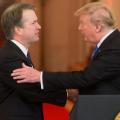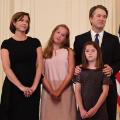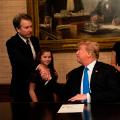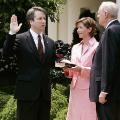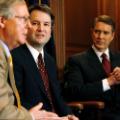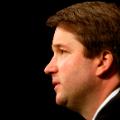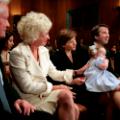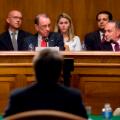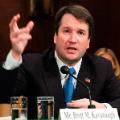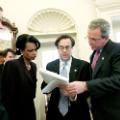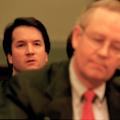(CNN)Here's a look at the life of Supreme Court Justice Brett Kavanaugh.
Personal
Birth date: February 12, 1965
Birth place: Washington, DC
Birth name: Brett Michael Kavanaugh
Read More
Father: Everett Edward Kavanaugh Jr., president of a trade association
Mother: Martha Kavanaugh, teacher, prosecutor and judge
Marriage: Ashley (Estes) Kavanaugh
Children: Liza and Margaret
Education: Yale College, B.A., 1987, graduated cum laude; Yale Law School, J.D., 1990
Religion: Roman Catholic
Other Facts
Regularly taught courses on separation of powers and on the Supreme Court at Harvard Law School.
Kavanaugh finished the Boston Marathon in 2010 and in 2015.
Timeline
1990-1991 - Law clerk to Judge Walter Stapleton of the US Court of Appeals for the Third Circuit.
1991-1992 - Clerks for Judge Alex Kozinski of the US Court of Appeals for the Ninth Circuit.
1992-1993 - Attorney with the Solicitor General's Office at the Department of Justice.
1993-1994 - Serves as law clerk to Justice Anthony Kennedy.
1994-1997 and 1998 - Associate counsel for Independent Counsel Kenneth Starr's Whitewater investigation, which leads to the impeachment of President Bill Clinton.
1997-1998 and 1999-2001 - Partner at Kirkland & Ellis in Washington, DC.
2001-2003 - Serves as associate counsel and then senior associate counsel to President George W. Bush.
July 25, 2003 - Bush nominates Kavanaugh to the US Court of Appeals for the District of Columbia Circuit, but the Senate doesn't vote on Kavanaugh's nomination for almost three years.
July 2003-May 2006 - Serves as assistant and staff secretary to Bush.
May 26, 2006 - The Senate confirms Kavanaugh to the DC Circuit Court of Appeals by a vote of 57-36.
May 30, 2006 - Sworn in by Kennedy.
July 9, 2018 - President Donald Trump announces Kavanaugh as his nominee to fill the Supreme Court vacancy created by Kennedy's retirement.
September 4-7, 2018 - Confirmation hearings are held on Capitol Hill. A Senate Judiciary Committee vote is tentatively slated for the week of September 17.
September 16, 2018 - The Washington Post publishes an article about a California psychology professor who accuses Kavanaugh of attempting to rape her when they were both teenagers at a house party during the early 1980s. Christine Blasey Ford says she initially sent a letter to Senator Dianne Feinstein about the incident when Kavanaugh's name was included on a shortlist for the Supreme Court. Ford tells the newspaper she initially did not want to go public but she decided to talk on the record because her letter to Feinstein had been leaked to the media. Kavanaugh denies that such an incident ever took place.
September 23, 2018 - The New Yorker magazine publishes a report about a second allegation of sexual misconduct, prompting Feinstein to call for a postponement of confirmation proceedings. The magazine article centers on a college classmate from Yale, Deborah Ramirez who says Kavanaugh exposed himself to her while a group of students were drinking at a party in a dorm during the 1983-1984 academic year. Kavanaugh denies the allegation and a White House spokeswoman dismisses the claim as uncorroborated.
September 27, 2018 - Kavanaugh and Ford testify during an all-day hearing before the Senate Judiciary Committee.
September 28, 2018 - GOP Senator Jeff Flake, a member of the Judiciary Committee, agrees to vote yes, paving the way to a floor vote but he says the FBI should reopen its background investigation of Kavanaugh and spend a week looking into claims made by Kavanaugh's accusers. Trump later agrees to direct the FBI to reopen its background check but the probe will be limited in scope and must be completed in a week.
October 3, 2018 - The FBI completes its supplemental background check and sends the information to the Senate late in the day.
October 4, 2018 - The Wall Street Journal publishes an op-ed by Kavanaugh in which argues that he is an independent, impartial judge. He expresses regret for a few of his statements during the September 27 hearing, explaining that he was frustrated and emotional. He pledges, going forward, that litigants and colleagues will be treated with respect. The same day, retired Justice John Paul Stevens says that Kavanaugh's comments during his confirmation hearings suggest bias. Stevens says Kavanaugh should not serve on the Supreme Court.
October 6, 2018 - The Senate confirms Kavanaugh with a 50-48 vote. He is sworn in by Chief Justice John Roberts during a private ceremony. The vote takes place amid public protests for and against Kavanaugh's confirmation.
September 14, 2019 - The New York Times publishes an article adapted from a forthcoming book, "The Education of Brett Kavanaugh" that contains a new allegation of college sexual misconduct. According to the report, the FBI did not investigate the new allegation and the bureau did not speak with witnesses to verify Ramirez's original claim.
July 2020 - An exclusive CNN report says Kavanaugh urged his colleagues in a series of private memos this spring to consider avoiding decisions in major disputes over abortion and Democratic subpoenas for Trump's financial records, according to multiple sources familiar with the inner workings of the court.
October 28, 2020 - Kavanaugh tweaks a line in his controversial opinion on Wisconsin mail-in voting, after he received criticism for incorrectly saying Vermont had not changed its election rules due to the Covid-19 pandemic.
July 22, 2021 - Senator Sheldon Whitehouse releases a letter from the FBI disclosing that it received more than 4,500 tips on a phone line in 2018 as part of a background investigation Kavanaugh and provided "relevant" ones to former President Trump's White House counsel.
October 1, 2021 - The Supreme Court announces that Kavanaugh has tested positive for Covid-19. This is the first publicly known case of coronavirus among the high court's justices. Kavanaugh was fully vaccinated, according to the court.
June 8, 2022 - Nicholas John Roske is arrested near Kavanaugh's house, after calling emergency authorities to say he was having suicidal thoughts, had a firearm in his suitcase, and had traveled from California "to kill a specific US Supreme Court Justice." The Justice Department charges him with attempting to kidnap or murder a US judge.
January 20, 2023 - "Justice," a documentary examining the sexual assault allegations against Kavanaugh, premieres at the Sundance Film Festival.












